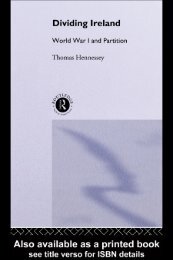Untitled
Untitled
Untitled
Create successful ePaper yourself
Turn your PDF publications into a flip-book with our unique Google optimized e-Paper software.
12 Introduction<br />
eval canon-law history would be an interesting topic.) The great<br />
Gabriel Le Bras defies classification: he was somewhere between<br />
law, theology and sociology: a great historian by nature but not<br />
by formal training. Joyce, a theologian, wrote a fine synthesis,<br />
and the German school of Catholic medieval historical theology,<br />
notably M•uller, Brandl, and Ziegler, also made contributions<br />
which have lost little of their value today. Still, they were not writing<br />
primarily for a community of historians and, perhaps more important,<br />
they wrote at a time when social history had not attained the<br />
dominance it enjoyed in the last decades of the twentieth century.<br />
Non-historians have continued to contribute even in those decades.<br />
Goody, who raised with great intelligence even if he did<br />
not solve the historical problem of the ‘forbidden degrees’, came<br />
from anthropology; Gaudemet, Weigand, Helmholz, and Donahue<br />
were again from law; Jean Leclercq, though clearly a<br />
historian in his attitudes and approach and with his finger on the<br />
See especially his article on ‘Mariage. III. La doctrine du mariage chez les<br />
th‹eologiens et canonistes depuis l’an mille’, in Dictionnaire de th‹eologie catholique<br />
(15 vols. excluding indexes; Paris, 1899–1950), ix (1926), 2123–223.<br />
G. H. Joyce, Christian Marriage: An Historical and Doctrinal Study (London<br />
etc., 1933).<br />
M. M•uller, Die Lehre des hl. Augustinus von der Paradiesesehe und ihre Auswirkung<br />
in der Sexualethik des 12. und 13. Jahrhunderts bis Thomas von Aquin:<br />
Eine moralgeschichtliche Untersuchung (Studien zur Geschichte der katholischen<br />
Moraltheologie, 1; Regensburg, 1954).<br />
L. Brandl, Die Sexualethik des heiligen Albertus Magnus (Regensburg, 1955).<br />
J. G. Ziegler, Die Ehelehre der P•onitentialsummen von 1200–1350: Eine Untersuchung<br />
zur Geschichte der Moral- und Pastoraltheologie (Regensburg, 1956).<br />
J. Goody, The Development of the Family and Marriage in Europe (Cambridge,<br />
1983). This has received a fair amount of criticism though there has been a general<br />
appreciation too of the way the book has opened up the subject. For my own critiques<br />
see ‘Peter Damian, Consanguinity and Church Property’, in L. Smith and B. Ward<br />
(eds.), Intellectual Life in the Middle Ages: Essays Presented to Margaret Gibson<br />
(London, 1992), 71–80 at 76–7, and ‘Lay Kinship Solidarity and Papal Law’, in P.<br />
Sta·ord, J. L. Nelson, and J. Martindale (eds.), Law, Laity and Solidarities: Essays<br />
in Honour of Susan Reynolds (Manchester, 2001), 188–99.<br />
J. Gaudemet, Le Mariage en Occident: les m¥urs et le droit (Paris, 1987), to<br />
name only one of his contributions.<br />
R. Weigand, Liebe und Ehe im Mittelalter (Bibliotheca Eruditorum, 7; Goldbach,<br />
1993).<br />
R. H. Helmholz, Marriage Litigation in Medieval England (Cambridge, 1974).<br />
C. Donahue, Jr., ‘The Monastic Judge: Social Practice, Formal Rule, and the<br />
Medieval Canon Law of Incest’, in P. Landau, with M. Petzolt (eds.), De iure<br />
canonico medii aevi: Festschrift f•ur Rudolf Weigand (Studia Gratiana, 27; Rome,<br />
1996), 49–69; (with Norma Adams), Select Cases from the Ecclesiastical Courts of the<br />
Province of Canterbury, c. 1200–1301 (Selden Society, 95; London, 1981).<br />
See above, n. 37.








